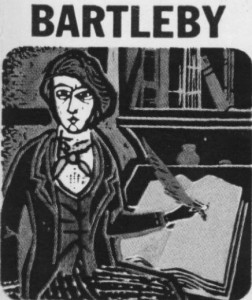It is not rare, sometimes it is even common, that an author speaks about his or her self in their works. Herman Melville’s “Bartleby, the Scrivener” is often considered such a story. Many of the characters in the story and images created allude to Melville’s writing career, which was generally deemed a failure. The main character in the story can either be Bartleby or the narrator, but Melville partially embodies both of them.
We understand towards the narrator’s reasoning for keeping Bartleby and for the sympathy he shows for Bartleby. After the general  failure of Moby Dick, at least in Melville’s time, he immediately wrote Pierre, which was a deeply personal novel. This self pity could have been continued in “Bartleby, the Scrivener”. In addition, Bartleby seemed to feel that continuing copying was worthless, possibly from spending many years in a dead letter office. Melville probably felt this way, but needed to continue writing to support his family. When Bartleby is in prison, he wastes away without abruptly dying, degeneration until the point no one notices his absence. Melville had reached the prime of his popularity early in his career, so when he published Moby Dick, his career was already in decline. His disappointment was only to increase as his career diminished until his death which was hardly noticed in the literary community.
failure of Moby Dick, at least in Melville’s time, he immediately wrote Pierre, which was a deeply personal novel. This self pity could have been continued in “Bartleby, the Scrivener”. In addition, Bartleby seemed to feel that continuing copying was worthless, possibly from spending many years in a dead letter office. Melville probably felt this way, but needed to continue writing to support his family. When Bartleby is in prison, he wastes away without abruptly dying, degeneration until the point no one notices his absence. Melville had reached the prime of his popularity early in his career, so when he published Moby Dick, his career was already in decline. His disappointment was only to increase as his career diminished until his death which was hardly noticed in the literary community.
The narrator also resembles Melville, but in a different way. Melville uses the narrator to view his own situation from a 3rd person perspective. He attempts, and is somewhat successful, in getting readers to feel sympathy for Bartleby, therefore, sympathy for him. On the contrary, the narrator also scorns Bartleby’s persistence after he stops copying: “In plain fact, he had now become a millstone to me…”(1149). In this respect, the narrator also represents Melville’s literary critics.
Behind the relationship between Melville, the narrator, and Bartleby, one can also see the relationship between the narrator and an ideal audience that Melville would have wanted. He probably wished that his writing would be more popular among the readers, although he professed his own demise with Bartleby’s atrophy. His other employees, Turkey, Nippers, and Ginger Nut, were similar to other writers who inspired Melville, such as Nathaniel Hawthorne. The narrator describes them as “most valuable” and “accomplishing a great deal”(1133). However, this inspiration from other authors could have depressed Melville, who was not nearly as successful.
In “Bartleby, the Scrivener”, Melville tries to relate to the reader and explain his declining situation. This story, on an allegorical level represents Melville, his life, and what he wished his reading audience would understand about him. This is probably what he wanted, but readers, initially, see a melancholy story about the condition of humanity.
